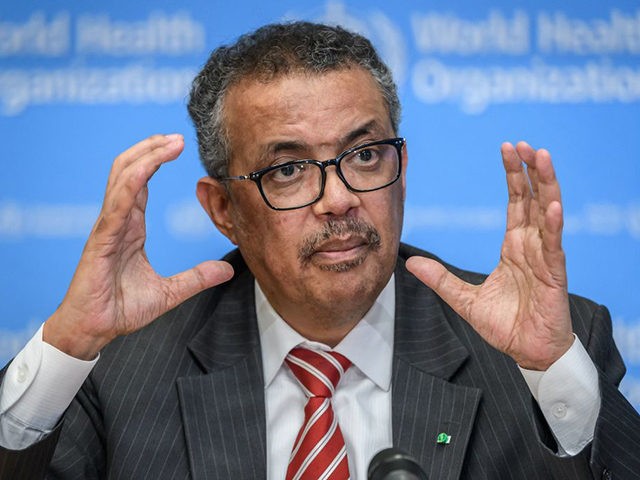Speaking at the second “Global Covid Summit,” hosted by the Biden administration, World Health Organization (W.H.O.) Director-General Tedros Adhanom Ghebreyesus said that while the supply of coronavirus vaccines has improved, “vaccine hesitancy driven by mis- and disinformation” is keeping vaccination rates too low in much of the world.
“The last time we met, in September last year, little did we know that the omicron wave was just around the corner,” Tedros said, referring to the first “Global Covid Summit” eight months ago. The summit is meant to address and discuss the handling of the Chinese coronavirus pandemic.
“So although reported cases and deaths are now decreasing globally, it is misguided to think this pandemic is over. The pandemic is not over anywhere until it’s over everywhere,” he said.
Tedros lamented that “cases are increasing in more than 70 countries,” while test rates around the world are “plummeting,” and “almost one billion people in lower-income countries remain unvaccinated.”
Although he cited “vaccine hesitancy” as a major factor keeping vaccination rates down, Tedros said the biggest challenge remains “in-country delivery of vaccines,” plus insufficient funding for “tests and new therapeutics.”
The W.H.O. director touted the ACT Accelerator as “the best way to get life-saving Covid-19 [Chinese coronavirus] tools to the countries that need them,” but warned it “faces a $15 billion shortfall.”
Although its name makes it sound like a piece of technology, the “Access to Covid-19 Tools Accelerator“ is actually a W.H.O. program that began in April 2020. Its partners include the World Bank, UNICEF, and the Bill and Melinda Gates Foundation.
“W.H.O.’s own Strategic Preparedness, Readiness and Response Plan, our comprehensive roadmap for ending the pandemic, likewise faces a shortfall of $1 billion,” Tedros added.
Tedros concluded by calling for more funding of the ACT Accelerator and other programs, more investment in local production of vaccines, and “policy commitments to boost vaccination, testing and treatment in countries.”
“We call for political commitment to support the Financial Intermediary Fund, and a new architecture for global health security,” he concluded.
This was a reference to the Global Health Security (GHS) Fund proposal, which would be administered by the World Bank. The “Global Covid Summit” included $712 million in new commitments toward the GHS fund, adding to $250 million previously pledged. The United States has pledged $400 million toward the fund to date.
The GHS aspires to command at least $10 billion annually when fully funded, geared largely toward moving pandemic preparedness equipment and training into outbreak zones and incentivizing local governments to quickly implement effective pandemic controls. It is difficult to see how these expensive precautions would be effective with outbreaks that begin in secretive authoritarian regimes with a documented history of lying to international agencies, as was the case with the Wuhan coronavirus.

COMMENTS
Please let us know if you're having issues with commenting.